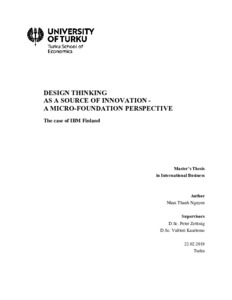Design thinking as a source of innovation - a micro-foundation perspective : The case of IBM Finland
Nguyen, Nhan (2019-02-25)
Design thinking as a source of innovation - a micro-foundation perspective : The case of IBM Finland
Nguyen, Nhan
(25.02.2019)
Julkaisu on tekijänoikeussäännösten alainen. Teosta voi lukea ja tulostaa henkilökohtaista käyttöä varten. Käyttö kaupallisiin tarkoituksiin on kielletty.
avoin
Julkaisun pysyvä osoite on:
https://urn.fi/URN:NBN:fi-fe201903016769
https://urn.fi/URN:NBN:fi-fe201903016769
Tiivistelmä
Innovation plays a key role in enabling firms to gain a competitive advantage in the rapidly changing business environment. In the management realm, innovation capability which is a characterised as a systematic approach to account for building new knowledge and competitive advantage has attracted considerable attention, both scholarly and popular. The contribution of this concept has, nevertheless, been general and received little attention within how it can be built and developed.
The success drawn from design and its expansion beyond the original exclusive design world to a variety of other disciplines have been recognised. Design thinking which is characterised as a human-centered and multi-disciplinary approach and gets inspiration from professional designers’ practices emerges as a promise to innovation. The portray of design thinking as a linear approach is, however, inadequate because little empirical evidence has focused on specific settings or individuals using it.
By bridging the concepts of innovation capability, design thinking, and micro-foundations, this study seeks to closely examine how individual interactions which are facilitated by design thinking approach produce innovative outcomes, ultimately enhancing innovation capability of a firm over time. Furthermore, the research also sheds light on the interplay between individual and firm level, and scrutinises the mechanism to address the paradox in innovation projects between exploiting what has been known and exploring what is unknown to the firm. This exploratory qualitative research work is informed by a single-case study of IBM Finland as a corporate setting.
The findings showed that innovations occur within the “third space” which is formulated by people from different organisations and led by the design-driven facilitators, or vendor team at the project level. As a result, innovation capability is developed by means of an accumulative learning process which is systematically managed with the support of technology. The present results highlight the implications for project-based businesses, non-design-background practitioners and managers, and management educators.
The success drawn from design and its expansion beyond the original exclusive design world to a variety of other disciplines have been recognised. Design thinking which is characterised as a human-centered and multi-disciplinary approach and gets inspiration from professional designers’ practices emerges as a promise to innovation. The portray of design thinking as a linear approach is, however, inadequate because little empirical evidence has focused on specific settings or individuals using it.
By bridging the concepts of innovation capability, design thinking, and micro-foundations, this study seeks to closely examine how individual interactions which are facilitated by design thinking approach produce innovative outcomes, ultimately enhancing innovation capability of a firm over time. Furthermore, the research also sheds light on the interplay between individual and firm level, and scrutinises the mechanism to address the paradox in innovation projects between exploiting what has been known and exploring what is unknown to the firm. This exploratory qualitative research work is informed by a single-case study of IBM Finland as a corporate setting.
The findings showed that innovations occur within the “third space” which is formulated by people from different organisations and led by the design-driven facilitators, or vendor team at the project level. As a result, innovation capability is developed by means of an accumulative learning process which is systematically managed with the support of technology. The present results highlight the implications for project-based businesses, non-design-background practitioners and managers, and management educators.
